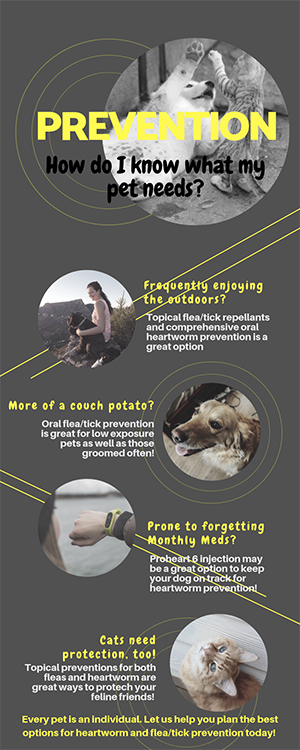Physical Examinations
 The cornerstone for preventative care, just like at your family doctor’s office, is the physical exam. We go from nose to tail, observing, listening, and palpating your pet to find any changes or abnormalities. Using these details noted on examination, we can compile a more complete recommendation for continued care or intervention for an issue noted on exam.
The cornerstone for preventative care, just like at your family doctor’s office, is the physical exam. We go from nose to tail, observing, listening, and palpating your pet to find any changes or abnormalities. Using these details noted on examination, we can compile a more complete recommendation for continued care or intervention for an issue noted on exam.
One of the most important aspects in the physical exam process is YOU! Your observations and at-home activities with your pet are essential to help put physical exam findings into perspective and to help plan for what those findings can mean for future care or intervention. Listening to your concerns is vital to fulfilling our goal of bringing you in to our family here at Okoboji.
We also understand that many pets will act completely different here than at home, which can mask certain problems or even make examination difficult in those pets that are fearful. Vet visits are weird and often have to be more invasive than the typical day-to-day physical comfort level of most pets. Low stress handling techniques paired with your insight into your pet’s behavior can create an even more effective visit!
As a reward for continued excellent care of your furry family member, we offer our yearly physical exams at no extra cost to recommended wellness items bundles that may be due. Ready to join our family? Call us today at 405-513-5905 to schedule an appointment!
Vaccinations
Immunizations against disease are one of the most important aspects of wellness care for your pet. We understand the confusion and worry that circulates due to inaccurate or misconstrued information on the internet in regards to vaccines and we are here to help. One of our biggest goals in veterinary medicine is to be there for education and insight into what the best options are for you and your furry family members.
We have based our vaccination guidelines based on those set forth through the American Animal Hospital Association (AAHA) and World Small Animal Veterinary Association (WSAVA) and we can sit down with your previous health records to help you decide the best course of action to keep your pet as safe as possible.
A major consideration to make when vaccinating your pet is how long it takes for a vaccine to become protective. Injectable vaccinations (most vaccines) rely on the immune system to analyze and respond to the injection to become protective, which often can take around 2 weeks to happen! This is very important to remember when scheduling vaccinations for visits to grooming and boarding facilities!
Do needles make you (or your pet) uncomfortable? Many people quite understandably have issues watching vaccinations or blood draws and if you fall into that category, don’t hesitate to let us know! We can make arrangements to have you step out of the room or vaccinate in our main treatment ward, safely out of view. In many cases, with food distractions we use (or if you bring some tasty treats your pet loves with you) paired with low stress handling, we can often administer vaccines without you or your pet even noticing the needle!
Need to update vaccines on your pet? Not sure what they need? Give us a call and we can help you at 405-513-5905.
Heartworm Prevention & Flea/Tick Prevention
 Heartworm Prevention is an essential part of any canine, and even feline, health plan! This mosquito-transmitted parasite was once thought to be relatively contained in the warm southern parts of the country, but now has been diagnosed in all 50 states. Unfortunately, that means year round prevention is essential to keep this disease at bay.
Heartworm Prevention is an essential part of any canine, and even feline, health plan! This mosquito-transmitted parasite was once thought to be relatively contained in the warm southern parts of the country, but now has been diagnosed in all 50 states. Unfortunately, that means year round prevention is essential to keep this disease at bay.
A common misconception about heartworms is how they are transmitted and where they live. Heartworms are a parasite that lives in the blood where the adults will lodge in the right side of the heart and great vessels in the surrounding area. Heartworms cannot be transmitted between pets in a household by direct contact or even blood to blood contact. Only mosquitos can take young heartworms from infected dogs, allow them to mature to an infective stage, and transmit them to another pet. Surprisingly, cats can be infected with heartworms, although they are not the ideal host for the parasites. This fact leads to some very bizarre symptoms that can lead to chronic, hard to diagnose symptoms such as chronic asthma signs or even sudden death in cats.
The most common signs noted in dogs with heartworms include coughing and exercise intolerance, however, these signs in heavily infected or smaller dogs can progress to collapse and death. In dogs, we have great in-house testing options available for diagnosis; many require only a few drops of blood. Treatment is available for heartworm infections in dogs, however, it is often very costly and requires long-term exercise restriction.
A new and more disheartening issue has been developing due to inappropriate and inconsistent use of preventatives over time – resistant strains of heartworm! Similar to bacterial resistance to antibiotics, this new threat has been developing due to several factors, including inconsistent use, and is one of the paramount reasons we require yearly heartworm screening prior to administration or prescribing refills of prevention.
Mosquito control or limiting exposure to mosquitos as much as possible is another modality paired with heartworm prevention that can be of major assistance in decreasing chances of acquiring a heartworm infection! Thankfully, we have options available that are combined with flea and tick preventions to provide this extra line of defense.
Fleas are one of the most common parasites to dogs and cats nationwide. Despite their tiny size, they can become an infestation that can quickly get out of hand and cause serious consequences from skin irritation and infection to tapeworms and even severe anemia! Oklahoma is a great place for ticks to flourish every season of the year, which can mean a major headache for pet parents. Some of the consequences of tick exposure can be difficult to notice until they create major issues in your pet! Yearly screening of dogs for common tick-borne illnesses is highly advised to keep aware of potential long-term effects this obnoxious arachnids can have on your family. The great news is there are many types of prevention on the market that can be highly effective in keeping your pets safe!
One of the great things about a wide variety of heartworm and flea/tick preventions on the market is our ability to match your pet with the best options available for your lifestyle. We even have the option to ship your doses of prevention directly to you each month if you have any issues remembering to give them on time through our online pharmacy!
Do you have any parasite prevention to protect your pet’s health? Call us today and we can help you choose the option that is best for you and your pet! 405-513-5905
Click here to schedule your
next wellness evaluation for your pet
Or, call or text us at (405) 513 – 5905 and learn about the Okoboji Veterinary Hospital difference today!

